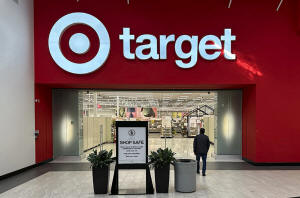Target's DEI rollback raises questions about the retail giant's
philanthropic commitments
 Send a link to a friend
Send a link to a friend
 [January 29, 2025] By
JAMES POLLARD [January 29, 2025] By
JAMES POLLARD
NEW YORK (AP) — Target's rollback on diversity, equity and inclusion
initiatives is raising questions about the retail giant's philanthropic
commitment to fighting racial disparities and promoting progressive
values in liberal Minneapolis, where it is based, and beyond.
Target and the Target Foundation have made six-figure donations in
recent years to groups working on Black economic empowerment and LGBTQ+
acceptance. “Racial equity” is still listed as a cornerstone of the
foundation's local grantmaking. But some fundraisers now wonder whether
those types of gifts remain a primary concern for the brand, as Target
joins other major American companies in curtailing internal DEI efforts
attacked most prominently by President Donald Trump's administration.
“Billions of dollars are spent annually on DEI, but rather than reducing
bias and promoting inclusion, DEI creates and then amplifies prejudicial
hostility and exacerbates interpersonal conflict,” The White House said
in a statement accompanying Trump's executive orders.
Corporations — including Walmart, Amazon and Meta — are retreating from
policies intended to counter discrimination, many of which were
implemented after the Minneapolis police killing of George Floyd, a
Black man, in 2020. Philanthropic advisors say the conservative backlash
is also chilling support from some funders who fear that backing
race-based nonprofit work could bring legal challenges like the one that
successfully shuttered the Fearless Fund's grant contest for Black women
business owners.

Target announced Jan. 24 that it would conclude the DEI goals previously
set to increase Black employees' representation and advancement, improve
Black shoppers' experiences and promote Black-owned businesses. The
company plans to stop submitting reports to external diversity surveys
and named Human Rights Campaign's Corporate Equality Index as an
example. It is also “further evaluating our corporate partnerships to
ensure they are directly connected to our roadmap for growth," according
to a memo posted on its website.
Target did not share publicly what those changes meant for its
philanthropy — which totaled $384 million last year in cash and products
from the corporation and its foundation, according to the company. In
response to an Associated Press inquiry, the company described
philanthropy as “a key way Target engages with communities, whether in
our hometown of Minneapolis-St. Paul, in the communities surrounding our
stores, or in the countries where our supply chain exists.”
A company spokesperson told AP that the “recent update does not impact
Target Foundation giving” but added that, “as always, the foundation
will continue to evaluate how it best supports organizations, coalitions
and networks.” Also unchanged is the Target Circle community giving
program that allows loyalty members to decide which nonprofits the
company supports. Target did not say what impact the internal changes
might have on its corporate giving.
“Whenever you see corporate leadership making shifts in priorities, it
worries folks in the foundation space about what impacts that might have
on both existing giving and future initiatives,” said OutFront Minnesota
Executive Director Kat Rohn, who said their LGBTQ+ advocacy group is not
a Target partner.

[to top of second column] |

A person heads into a Target store Thursday, Jan. 11, 2024, in
Lakewood, Colo. (AP Photo/David Zalubowski, File)
 The changes have already influenced
how one longtime partner sees their relationship. Twin Cities Pride
Executive Director Andi Otto said he learned about the changes when
he contacted Target about re-upping its sponsorship of his
nonprofit's programming celebrating the LGBTQ community. Target had
consistently contributed around $50,000, Otto said.
As he pitched Target on recommitting this year,
Otto said he was asked to set up a meeting with company leaders. On
the call, according to Otto, executives explained that they still
wanted to sponsor Twin Cities Pride but let him know they would be
removing internal DEI policies.
Otto said he appreciated the “heads up" but chose to reject Target's
sponsorship after his board discussed the impact of the company's
moves on the community they serve.
Inclusion falls by the wayside when there aren't checks to ensure
it, he added.
“It isn’t always just about the money that they give to us as a
nonprofit, but it’s about what they are doing for the community in
getting small, BIPOC- or LGBTQ-owned businesses into their stores
and giving them a platform to do so,” Otto said.
Twin Cities Pride had seen this coming. Otto recalled that Target
didn't carry Pride Month merchandise at its stores last June after
the collection received backlash in 2023 and said the nonprofit
feared things would “just continue down that slope.”
Progressive activists are now calling for a boycott of Target. Nina
Turner's working-class advocacy group We Are Somebody is asking
customers to instead purchase directly from minority-owned brands.
At least one Black-owned brand, Oh Happy Dani, has begun “the
process of removing our remaining products from Target shelves,"
according to a LinkedIn update from founder Danielle Cook Balfour.
Corporate philanthropy can be a reliable source of significant
nonprofit funding. Target has long had a very significant presence
in the Twin Cities and is notable for its support of education, arts
and other diversity efforts. Target and the Target Foundation
together were the fifth-largest corporate giver in the state in
2022, according to the Minnesota Council on Foundations.

But Rohn, the LGBTQ advocate and fundraiser, said corporate
philanthropy can sometimes put nonprofits in a "tough spot” by
pitting their values against the need to sustain their programs. She
expects that more nonprofits will step back from corporate
relationships — as Twin Cities Pride did — when their missions no
longer align with their sponsors.
To that point, Twin Cities Pride shared Monday that more than
$50,000 had been raised since the nonprofit cut Target as a sponsor.
Individuals donated more than half the total, according to Otto. The
Minneapolis Foundation also contributed.
“Right now, all of us in the LGBTQ nonprofit sector are afraid
because we don’t know what companies will choose to do and what the
outcome is going to be," Otto said. "I think everybody right now
agrees that it was the best decision to make, and that (if) we stick
together, we’ll see things on the other side.”
All contents © copyright 2025 Associated Press. All rights reserved |